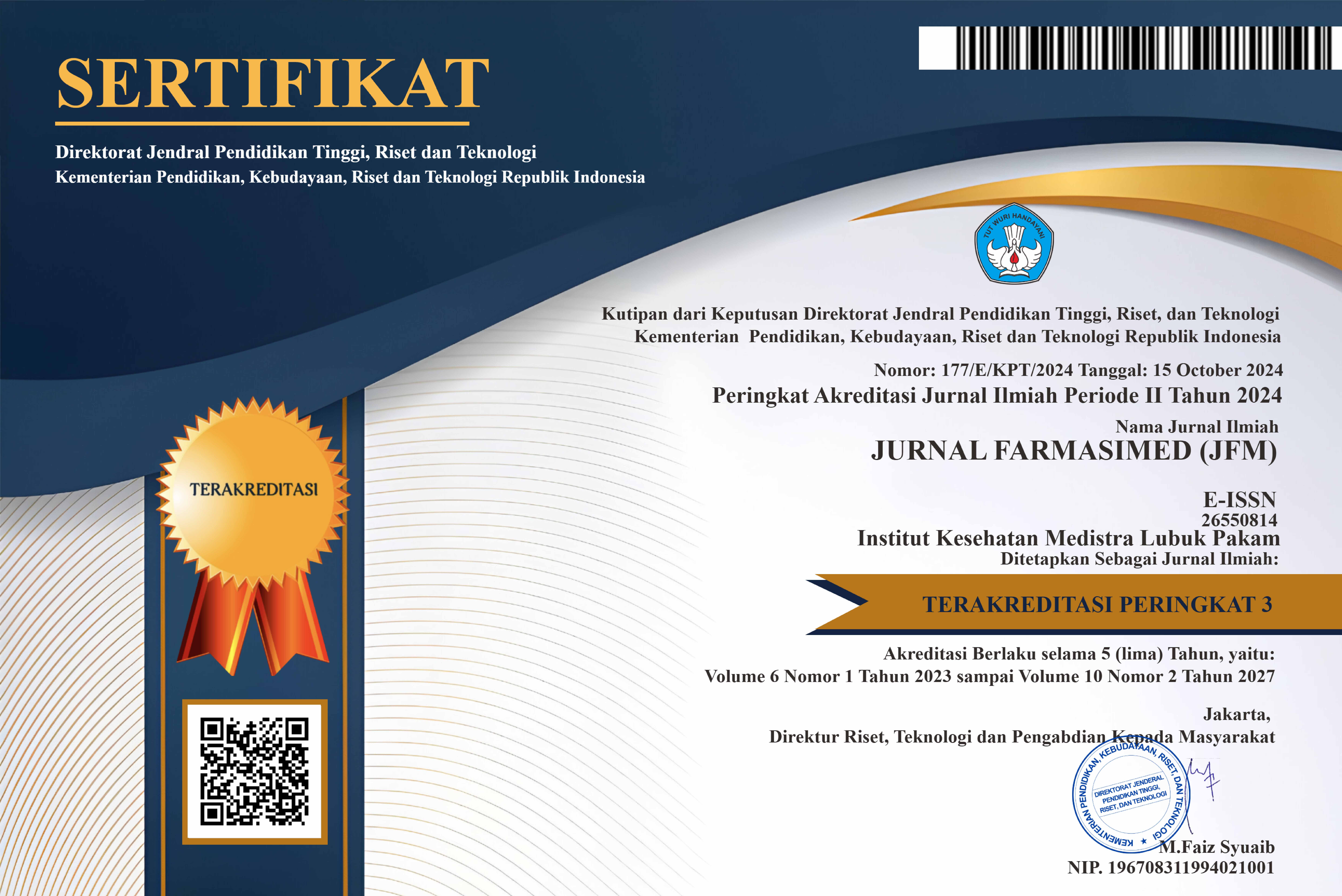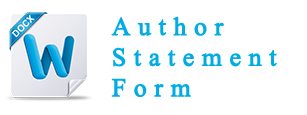Testing The Effectiveness of An Ethanol Extract Gel Preparation of Kelakai Leaves (Stenochlaena palustris (Burm.F.) Bedd.) on Reducing The Extent of Burns in Male White Rats (Rattus novergicus)
DOI:
https://doi.org/10.35451/jfm.v7i2.2685Keywords:
Kelakai Leaves, Formulation, Reduction of Burn Wound Area, Gel, RatsAbstract
The wound healing process is essential for restoring body tissue to its original integrity or normal function. This process involves several stages, including the inflammatory, proliferative, and maturation phases. Both internal and external factors play a role in accelerating wound healing. Kelakai leaves are traditionally used as a topical treatment for burns in gel form, as they are safe for use, non-toxic, and do not cause harmful side effects. The most significant effect was observed with the gel formulation containing 15% w/w kelakai leaf extract, which was able to reduce burn wound area by 13.75%. This demonstrates the effectiveness of kelakai leaf extract gel (Stenochlaena palustris (Burm. F.) Bedd.) in the wound healing process. Therefore, the gel has the potential to reduce the extent of burn injuries.The aim of this study was to analyze the effect of various concentrations of ethanol-based kelakai leaf extract gel. As an effort to reduce burn wound area, this research included several stages, starting from the collection of materials and equipment, plant identification, research procedures, to the extraction process of kelakai leaf simplicia using maceration. This was followed by phytochemical screening and gel formulation at concentrations of 5%, 10%, and 15%, which were then tested for effectiveness on male white rats. The data were analyzed using ANOVA with a significance level of p < 0.050. The findings indicate that the gel containing kelakai leaf extract has a significant effect in reducing the burn wound area in rats.
Downloads
References
Proksch, E., Brandner, J. M., & Jensen, J. M. (2008). The skin: An indispensable barrier. Experimental Dermatology, 17(12), 1063–1072. https://doi.org/10.1111/j.1600-0625.2008.00786.x
Guo, S., & DiPietro, L. A. (2010). Factors affecting wound healing. Journal of Dental Research, 89(3), 219–229. https://doi.org/10.1177/0022034509359125.
Velnar, T., Bailey, T., & Smrkolj, V. (2009). The wound healing process: An overview of the cellular and molecular mechanisms. Journal of International Medical Research, 37(5), 1528–1542. https://doi.org/10.1177/147323000903700531.
Rowan, M. P., Cancio, L. C., Elster, E. A., Burmeister, D. M., Rose, L. F., Natesan, S., ... & Chung, K. K. (2015). Burn wound healing and treatment: Review and advancements. Critical Care, 19, 243. https://doi.org/10.1186/s13054-015-0961-2.
World Health Organization (WHO). (2018). Burns. World Health Organization. Retrieved from https://www.who.int/news-room/fact-sheets/detail/burns
Church, D., Elsayed, S., Reid, O., Winston, B., & Lindsay, R. (2006). Burn wound infections. Clinical Microbiology Reviews, 19(2), 403–434. https://doi.org/10.1128/CMR.19.2.403-434.2006
Annisa, Lulu. 2017. Formulasi dan Uji Stabilitas Fisika-Kimia Sediaan Gel Etil PMetoksisinamat Dari Rimpang Kencur (Kaempferia galanga Linn.). [Skripsi]. Jakarta. Fakultas Kedokteran dan Ilmu Kesehatan Program Studi Farmasi
Nisa, H. (2022). Lumatan Daun Kelakai (Stenochlaena Palustris (Burm. F)) untuk Mempercepat Penutupan Luka Terkontaminasi pada Mencit Putih (Mus musculus). Jurnal Penelitian Kesehatan Suara Forikes, 13(Nomor Khusus), 146–152. https://doi.org/10.33846/sf13nk426
Hertian, S. (2021). Efektivitas gel ekstrak daun kelakai (Stenochlaena palustris (Burm.F.) Bedd.) terhadap penyembuhan luka bakar pada tikus putih jantan. Jurnal Farmasi dan Ilmu Kefarmasian Indonesia, 8(2), 120–128. (Jika ini sumber asli, DOI perlu dicari dari jurnal resminya)
Jamilah, J., Billi, J., & Effendi, H. (2022). Pengaruh pemberian sediaan salep ekstrak daun dan batang kelakai (Stenochlaena palustris (Burm. f) Bedd) terhadap penyembuhan luka sayat pada kulit tikus putih. Jurnal Kesehatan Borneo Cendekia, 6(1), 1–8. https://doi.org/10.54411/jbc.v6i1.278
Trease, G. E., & Evans, W. C. (2002). Pharmacognosy (15th ed.). London: Saunders.
Ansel, H. C., Allen, L. V., & Popovich, N. G. (2005). Ansel's pharmaceutical dosage forms and drug delivery systems (8th ed.). Lippincott Williams & Wilkins.
Nisa, H. (2022). Lumatan Daun Kelakai (Stenochlaena Palustris (Burm. F)) untuk Mempercepat Penutupan Luka Terkontaminasi pada Mencit Putih (Mus musculus). Jurnal Penelitian Kesehatan Suara Forikes, 13(Nomor Khusus), 146–152. https://doi.org/10.33846/sf13nk426
Ansel, H. C., Allen, L. V., & Popovich, N. G. (2005). Ansel's pharmaceutical dosage forms and drug delivery systems (8th ed.). Lippincott Williams & Wilkins.
Downloads
Published
Issue
Section
License
Copyright (c) 2025 Aminah Syarifuddin, Wilda Dani Syahfitri

This work is licensed under a Creative Commons Attribution-NoDerivatives 4.0 International License.
Copyright in each article is the property of the Author.

























